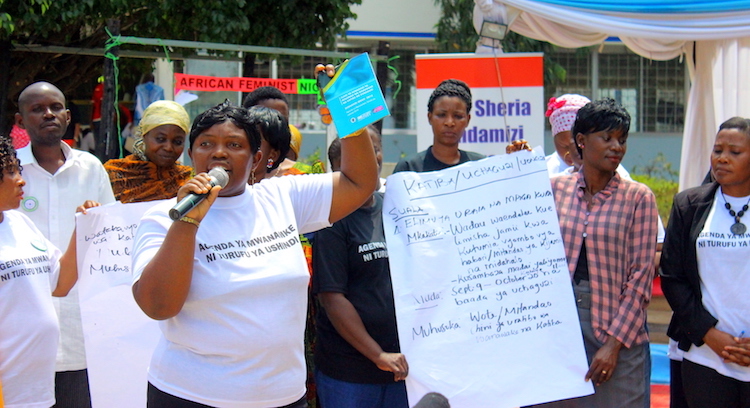
By Kizito Makoye
DAR ES SALAAM (IDN) – A poster bearing a message “Graduate with A’s not with AIDS” at the University of Dar es Salaam, tells a grim story of female students who offer sex to obtain higher grades.
“My teacher wanted to date me. When I refused his sexual advances, he retaliated by giving me poor grades,” says Helena (not her real name).
The 23-year-old law student, who has since experienced dismal performance in her studies, is increasingly worried about her academic future. (P09) GERMAN | JAPANESE TEXT VERSION PDF | PORTUGUESE | SWAHILI
The University of Dar es Salaam, known for academic excellence, was in the spotlight in late 2018 after allegations of sexual harassment against female students.
Sitting under a huge baobab tree where friends are huddled for group discussions, Helena, who is just one of many students who have fallen victim of sexual assault, has broken her silence.
“I have reported the issue to the anti-corruption authorities, I hope they will help me,” she says.
A culture of shame engulfing the university community has made it increasingly hard for the victims of sexual abuse to recount their tales, according to women’s rights groups.
As part of its efforts to deter sexual harassment against women, Tanzania’s Prevention and Combating of Corruption Bureau (PCCB), has established gender desks, where victims of sextortion can file their cases with female officers.
Sextortion is a form of corruption where people holding positions of authority extort sexual favours from students or women seeking jobs or promotion by using verbal coercion.
The move to establish gender desks, which comes barely two years after the East African country adopted ethical guidelines, ostensibly to deter bad behaviour among public servants, is hailed as a milestone in the fight against gender violence, say women’s rights campaigners.
Sextortion is a global phenomenon in which corruption and sexual exploitation intersect. Although the problem inflicts physical and mental distress on victims, authorities have failed on multiple fronts to address it.
Diwani Athumani, PCCB Director-General, explained that the bureau’s initiative is intended to seek justice for the victims of sextortion, with a view to ending sexual harassment in the male-dominated system.
“We encourage women to come forward to speak up against sexual corruption,” he said. “Breaking their silence will help them to be on the right side of justice.”
According to Athumani, the bureau has also launched a free hotline for people to report sexual abuse.
While sextortion is criminalised in Tanzania, campaigners say the law is too weak to deter the perpetrators who often pay the fines and get released.
Section 25 of Tanzania’s anti-corruption law of 2007 states: “Anybody being in the position of power or authority, who in the exercise of his authority, demands or imposes sexual favours, or any other favours on any person as a condition for giving employment, a promotion, a right, a privilege, or any other preferential treatment, commits an offence and shall be liable, on conviction, to a fine of not exceeding five million shillings or to imprisonment for a term not exceeding three years or both.”
Fighting for social justice is part of a growing pattern across Africa, where governments have joined forces with women’s rights activists to curb the rising wave of gender-based violence.
From Kigali to Accra, from Nairobi to Lagos, authorities and women rights activists are proving adept in creating public friendly units to address the distasteful trend of sexual harassment.
In Rwanda, the government had established a gender desk in 2005 with support from UN Women, to enhance the protection of women from abuse.
While anti-corruption laws offer some grounds for prosecuting sextortion, analysts say sexual discrimination and harassment laws often target the kind of abuse involved in sextortion.
“The manager who abuses his power to extort sex from junior officer who wants to avoid being fired, is engaging in both quid pro quo sexual harassment and sextortion,” said Eliana Mbugua, a Kenya-based gender rights expert.
According to Mbugua, many sexual harassment laws are confined to employment and only involve administrative sanctions.
In Tanzania, where nearly nine in every 10 women have experienced sexual harassment, campaigners say having gender desks where victims of sexual abuse can discreetly recount their tales to trained officials is a good move.
Leila Sheikh, a Dar es Salaam-based social justice activist, who had experienced sexual harassment while working for the Tanzania Commission for AIDS over a decade ago, urges women to raise their voices against the vice.
“Women need to speak up, to raise our voices against gender-based violence. Speaking up sets the wheel of justice in motion,” she says.
Sextortion, which undermines self-confidence, is hard to prove since it takes place secretly and the evidence is elusive. While anecdotal evidence shows the prevalence of the problem, the authorities have not previously recorded data due to stigma and shame.
In a 2012 toolkit entitled “Naming, Shaming and Ending Sextortion”, the International Association of Women Judges highlighted gaps in criminal justice systems around the globe in addressing sextortion, while suggesting measures to improve domestic laws and policies.
Chris Peter Maina, Professor of Law at the University of Dar es Salaam, decries sextortion on the grounds that it violates fundamental ethical values, urging people holding positions of power to stop sexually harassing junior people over whom they exercise authority.
“Even though seducing someone may not technically constitute violation of the law, people in authority should not abuse their power,” he stresses.
Maina urges victims of sextortion to come forward and expose the perpetrators, saying that “victims’ fear of exposing perpetrators is the main barrier to the effective fight against sextortion.” [IDN-InDepthNews – 12 June 2019]
Photo: Women taking part in a demonstration to oppose sextortion in Dar es salaam in 2018. Credit: Edwin Mjwahuzi
SUPPORT US in Speaking Out for People, Planet and Peace.
IDN is flagship agency of the International Press Syndicate.
facebook.com/IDN.GoingDeeper – twitter.com/InDepthNews











